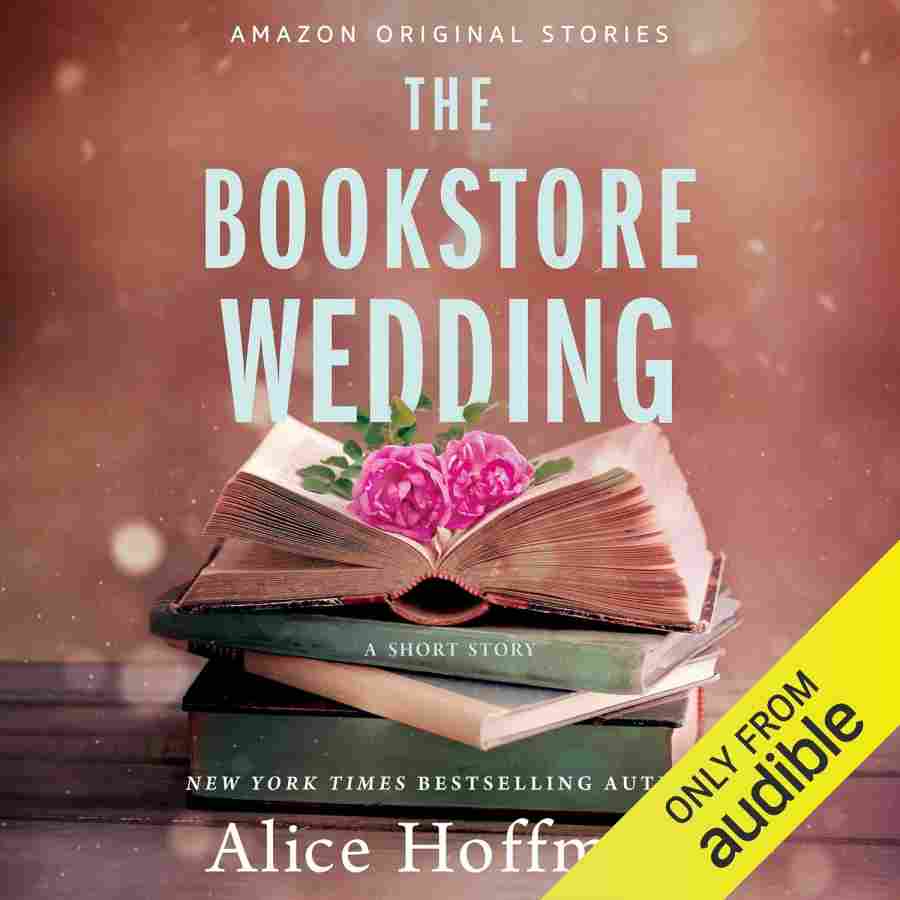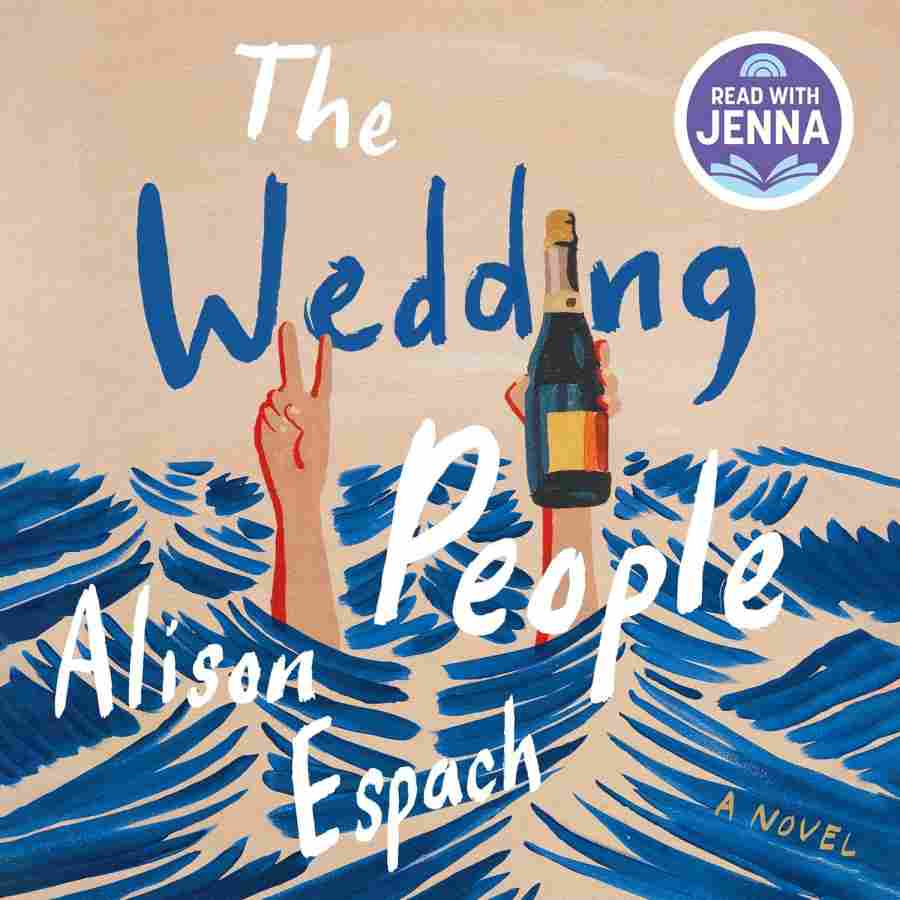
How did I find this audiobook, you ask? Consider a long day when my trusty collection of audiobooks had been exhausted. In my search for a new story, I came upon “The Bookstore Wedding” by Alice Hoffman. With Hoffman’s name attached, a master at weaving enchantment into the commonplace, it promised an enticing retreat. And so I dived in.
I’ve reviewed several books in the past, and this isn’t my first or last. I recall falling into Hoffman’s “The Marriage of Opposites” a few years ago. The deep character relationships and gorgeous, evocative sceneries made a lasting impression on me. “The Bookstore Wedding” reintroduced me to the same thrill, but in a more small, private setting.
Book Summary
In “The Bookstore Wedding,” Alice Hoffman tells a narrative about time, destiny, and the complexity of family and love. The story revolves on Isabel Gibson, who has returned to Brinkley’s Island, Maine, after an extended absence. She reunites with her sister Sophie and niece Violet, who work together in the family bookshop. Isabel’s life seems to be settling into a peaceful routine with her fiancé, Johnny Lenox, but there’s a catch: their marriage plans have been interrupted by a series of humorous but devastating occurrences.
Isabel and Johnny have booked their wedding three times, with each effort resulting in a disaster that stops them from marrying. With three cakes cooked and three celebrations planned, destiny seemed to be playing tricks on them. This continuous failure creates doubt on Isabel, leading her to wonder if their love is actually destiny.
As the novel progresses, we learn about the Gibson family’s past. Isabel and Sophie must address both their past traumas and the current problems that threaten to destroy their futures. Their path is one of forgiveness, healing, and, finally, realizing what love and family mean to them.
Characters
Isabel Gibson: The heroine returns to her hometown in search of serenity and love, but is greeted with unexpected hurdles. Her character is a mix of toughness and weakness, dealing with her past while attempting to protect her future.
Sophie Gibson, Isabel’s sister, is realistic and loving. She provides stability in Isabel’s life, but she, too, has unsolved concerns that need to be addressed.
Violet is Sophie’s daughter and Isabel’s niece, bringing a young charm to the story. She represents optimism and continuity in the family.
Johnny Lenox: Isabel’s patient and kind fiancé, who supports her despite the many wedding disasters. His character exemplifies persistent love and support.
Plot Analysis
Alice Hoffman has a talent for turning simple tales into meaningful experiences. In “The Bookstore Wedding,” she imbues the apparently prosaic ritual of wedding preparation with layers of passion, history, and her trademark magical touch.
The many botched wedding attempts are not only amusing, but also serve as a metaphor for the unpredictable nature of life and love. Each failure causes Isabel and Johnny to reconsider their relationship and commitment, emphasizing the concept that genuine love is about more than just the great moments, but also about enduring through the minor, daily challenges.
Isabel’s visit to Brinkley’s Island exemplifies a common Hoffman motif: returning to one’s origins to discover oneself. The story’s principal location, a family bookshop, serves as more than simply a background. It symbolizes the family’s heart, a location rich with memories and tales that define the characters’ lives.
The blending of personal and family history deepens the tale. Isabel and Sophie search through the relics of their history, uncovering long-buried truths. These disclosures compel individuals to face their own fears and anxieties, which eventually leads to development and healing.
Comparison of Other Works
When comparing “The Bookstore Wedding” to Hoffman’s earlier works such as “Practical Magic” or “The Rules of Magic,” the former is more anchored in reality while yet retaining the magical realism that makes Hoffman’s writing so compelling. The themes of family, love, and destiny appear often, yet each work addresses them differently.
While “The Rules of Magic” looks at the bigger picture of family curses and magical legacies, “The Bookstore Wedding” focuses on the intimate dynamics of a single family and their particular challenges. The narrative’s smaller scope does not decrease its effect; rather, it allows for a more intimate, personal relationship with the characters.
In “Practical Magic,” the Owens sisters struggle with their inherent magical skills and the social consequences of being unusual. Similarly, in “The Bookstore Wedding,” the Gibson sisters encounter unique problems stemming from their family past. Both tales underscore the value of sisterhood and the lasting power of love, although in different ways.
Spoilers ahead
As we go further into the story, the reasons for the unsuccessful wedding attempts become obvious. Isabel and Sophie are haunted by unresolved past difficulties more than just poor luck. The sisters must face their mother’s death and the secrets she carried to her grave. These disclosures prompt Isabel to reconsider her own views on love and marriage.
The narrative culminates in a dramatic and rewarding conclusion. Isabel and Johnny ultimately marry, but only after the sisters confront their issues and find peace. The wedding is more than simply the joining of two loves; it’s also a celebration of family reconciliation and acceptance.
The subplot about the bookshop is a lovely touch. As the sisters struggle to resuscitate the business, they rediscover their mutual love of reading and the comfort it brings. The bookshop becomes a symbol of their fortitude and a tribute to their mother’s memory.
Writing Style
Hoffman’s writing is charming as ever. Her talent to build rich, evocative settings transports readers to the world of Brinkley’s Island. Each description is filled with a feeling of location, making the island and bookshop seem like distinct personalities.
The language is realistic and interesting, conveying the complexity of family connections. Hoffman’s characters communicate authentically, reflecting their distinct personalities and experiences. The emotional depth of the interactions enhances the overall richness of the tale.
Themes
Several themes permeate “The Bookstore Wedding,” each adding dimensions to the story:
Love and Commitment: The fundamental topic is the enduring power of love in the face of adversity. Isabel and Johnny’s story demonstrates that genuine love requires patience and endurance.
Family and Healing: The Gibson sisters’ connection demonstrates the need of acknowledging the past in order to heal and move ahead. Their friendship is strained but eventually strengthened by their shared experiences.
destiny and Destiny: The recurrent wedding failures imply a fight against destiny, raising concerns about predestination and free choice. The characters’ journey exemplifies the concept that certain things are meant to be, but only if you endure.
Legacy and Memory: The bookshop represents the legacy left by the sisters’ mother. It is a location full with memories, both happy and tragic, that define the individuals’ identities and destinies.
Conclusion
“The Bookstore Wedding” is a lovely, touching story that exemplifies Alice Hoffman’s skill at mixing the ordinary with the remarkable. It’s a narrative about love, family, and the importance of confronting one’s past in order to construct a better future. This novel is a must-read for everyone who like romance, comedy, and a touch of magic.
Hoffman’s ability to develop recognizable people and position them in whimsical but realistic situations makes “The Bookstore Wedding” an absolute must-read. It serves as a reminder that the route to happiness is not always smooth, but it is the bumps that make the trip worthwhile.
The audiobook version, voiced by Jennifer Jill Araya, adds another depth of magic. Araya’s acting brings the characters to life, masterfully portraying their emotions as well as the complexities of the plot. Her voice matches Hoffman’s language, creating a wonderfully immersive listening experience.
In essence, “The Bookstore Wedding” demonstrates Alice Hoffman’s narrative skill. It’s a brilliantly produced story that will stay with readers long beyond the last page. Whether you’re a long-time follower of Hoffman’s work or new to her enchantment, this book will fascinate and inspire.

